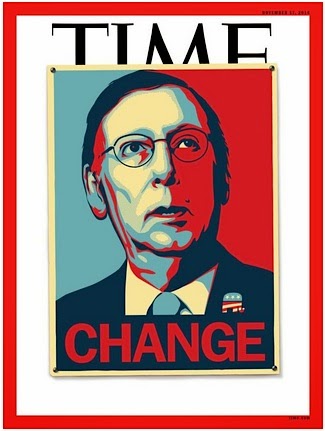Election 2014: Gridlock 2.0:
The new Congress and the next stasis
THE POSTWAR world of the United States is slowly taking shape in Washington. Republicans are flush with victory after Tuesday’s election, the results of which confer unto the GOP the first Republican-dominated Congress in eight years, and the biggest Republican majority in the House of Representatives since Truman.
Kentucky Sen. Mitch McConnell, fresh off his own big re-election win, is set to become the new Senate Majority Leader; the drapes are being pulled out of Harry Reid’s old office as we speak. And with the election announcing a new Congress, there was a brief détente of sorts on Capitol Hill early this week. The peace dove was loose in the air.
On Wednesday, McConnell said that, under his watch as majority leader, “we’re not gonna be shutting down the government or defaulting on the national debt” — a pre-emptive budgetary olive branch to the Obama administration if there ever was one. President Obama, likewise making nice, spoke the same day in the East Room of the White House, saying “I would enjoy having some Kentucky bourbon with Mitch McConnell.” We can hear the Woodford Reserve splashing into glasses, neat.
◊ ◊ ◊
But before you cue up “Kum Ba Yah,” take note of something else: Wednesday was the same day that McConnell and House Speaker John Boehner published an op-ed for The Wall Street Journal, outlining GOP plans in the new Congress.
On the wish list of the 114th Congress: revising the tax code; legislative support of charter schools, more militarily muscular responses to ISIS and other terrorist threats; construction of the Keystone XL pipeline; and the big one, “renewing our commitment to repeal ObamaCare, which is hurting the job market along with Americans’ health care.”
“The skeptics say nothing will be accomplished in the next two years,” they wrote. “As elected servants of the people, we will make it our job to prove the skeptics wrong.”
“I’ve made clear to the president that if he acts unilaterally, on his own, outside his authority, he will poison the well, and there will be no chance for immigration reform moving in this Congress,” Boehner said.
◊ ◊ ◊
WITH MCCONNELL and Boehner in the room, the president responded on Friday, pledging to implement an executive order authorizing perhaps as many as 5 million illegal immigrants to stay in the United States on at least a temporary basis, despite Republican objection. The Washington Post reports that the president “is expected to announce his intentions after returning from a visit to China, Burma and Australia, either this month or in early December.”
“The president has the authority to act by executive order on immigration,” House Democratic leader Nancy Pelosi told The New York Times later. “It’s in the law, but it’s also in the precedent of other presidents, whether it’s President Eisenhower, Kennedy, both Bushes, President Reagan — it just goes on and on.”
We’ve seen congressional-powered gridlock for much of the previous three years. Now we can anticipate a different kind of stasis, as President Obama (backed into an operational corner like never before) uses executive orders to advance his legislative agenda — and vetoes legislation coming from a Congress whose bills he’s rejected, but far more infrequently, before.
The source of gridlock we’ve become accustomed to is about to shift, moving from one between dueling halves of Congress to one between a unified Congress and a resistant White House — a variation of exactly what we’ve had for years already.
◊ ◊ ◊
In the heat of victory, Republicans have tried to keep their thumb on the scale over the meaning of Tuesday’s election and how its results are best interpreted. GOP thought leaders in recent days have become rather fond of certain tactical elocutions to define their idea of the coming course of action. They say the GOP’s victory on Tuesday means “the president must work with us” — which, by application of sound rhetorical logic, also means that they must work with the president. And why not?
According to the Associated Press, slightly more than 83 million people voted on Tuesday, about 36.6 percent of the voting-age population. So why does this victory by the Republicans, achieved with the lowest midterm voter turnout since 1942, have more traction, command more argumentative weight than the one by the Democrats in 2012, when 51 percent more Americans — 126 million — went to the polls?
Say what you will about what such a dismal midterm turnout says about Americans and participatory democracy; one of the takeaways of the Nov. 4th election is that it shouldn’t in any way be considered a mandate to run roughshod over the Obama White House. The turnout wasn’t nearly big enough for that to be true. If the vote on Tuesday was a vote for Republicans over Democrats, it was also a call for action over paralysis, productivity over partisanship. Despite being the winners on Tuesday, the GOP bears its share of blame for much of what made Tuesday’s vote possible.
And the stage is set for more of the same. Republicans’ fondest wish — that the president would just retire to the Residence with the wife and kids for the next two years, and let the Republicans run things without him — isn’t about to happen. And the Obama White House isn’t walking away from Obamacare, its signature domestic achievement, or the prospect of another major achievement on immigration reform, for the sake of advancing the Republican agenda.
Result? Another kind of gridlock.
◊ ◊ ◊
BUT MAYBE not. On Saturday, the president is expected to announce plans to nominate U.S. Attorney Loretta Lynch, now currently the U.S. Attorney for the Eastern District of New York, to replace Eric Holder as attorney general of the United States. If Lynch is confirmed by the new Republican-controlled Senate, she’d become the first African-American woman to be attorney general.
The climate surrounding Lynch’s confirmation hearings — whether they’re conducted in the bipartisan spirit the new Republican majority promises, or in the witch-hunt, pit-bull style of inquiry that’s common to hearings for Obama appointees — will say a lot about how serious the new congressional leadership really is about getting things done. She’s been confirmed by the Senate before, by the way. Twice.
The New York Times characterized the GOP’s first-blush response to Lynch as “guardedly positive.” Senator Charles E. Grassley of Iowa, senior Republican on the Judiciary Committee, said in a statement obtained by The Times that Lynch would get “a very fair, but thorough, vetting” by his committee.
“I’m hopeful that her tenure, if confirmed, will restore confidence in the attorney general as a politically independent voice for the American people,” Grassley said, in a cheap reflex dig at Holder.
◊ ◊ ◊
So yeah, hope springs eternal. There’s enough turmoil going on, enough energy loose in the capital as the year winds down, you think it’s maybe possible to hit the reset button on our expectations of government, and the wasteful, antagonistic opéra bouffe in Congress that’s compelled those expectations. Maybe the needle moves this time.
But when you look at the components of this new relationship in the cold political light of day, you have to be cautiously optimistic — with the emphasis on “cautiously.” Considering recent history, the parties in question and the stakes for both of them in two years, a new gridlock may yet morph out of the old one. Because when all’s said and done, the start of the 114th Congress in January ushers in familiar contrary forces, with work cut out for each of them:
A Democratic president who hasn’t been able to work with a divided oppositional Congress now has to work with a unified oppositional Congress, a body he’s never exactly rushed to embrace.
A Republican party that hasn’t been able to get unified in Congress now has to lead, as a presumably singular body, and work with a president it fundamentally doesn’t like.
A proud and competitive president unwilling to undermine or dismantle the legacy of his own administration. A new and newly emboldened Congress likely to feel obligated, sooner or later, to try to push him into doing just that.
If that’s not laying the foundation for the next gridlock, I don’t know what is.
Image credits: McConnell cover: TIME Magazine. Boehner and Obama: The White House. Election results graphic: The Huffington Post. Lynch: Michael Nagle for The New York Times.

.jpg)


.jpg)



.jpg)
Comments
Post a Comment